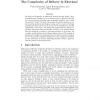Free Online Productivity Tools
i2Speak
i2Symbol
i2OCR
iTex2Img
iWeb2Print
iWeb2Shot
i2Type
iPdf2Split
iPdf2Merge
i2Bopomofo
i2Arabic
i2Style
i2Image
i2PDF
iLatex2Rtf
Sci2ools
108
click to vote
AAAI
2006
2006
The Complexity of Bribery in Elections
We study the complexity of influencing elections through bribery: How computationally complex is it for an external actor to determine whether by a certain amount of bribing voters a specified candidate can be made the election's winner? We study this problem for election systems as varied as scoring protocols and Dodgson voting, and in a variety of settings regarding the nature of the voters, the size of the candidate set, and the specification of the input. We obtain both polynomial-time bribery algorithms and proofs of the intractability of bribery. Our results indicate that the complexity of bribery is extremely sensitive to the setting. For example, we find settings where bribing weighted voters is NP-complete in general but if weights are represented in unary then the bribery problem is in P. We provide a complete classification of the complexity of bribery for the broad class of elections (including plurality, Borda, k-approval, and veto) known as scoring protocols.
Related Content
| Added | 30 Oct 2010 |
| Updated | 30 Oct 2010 |
| Type | Conference |
| Year | 2006 |
| Where | AAAI |
| Authors | Piotr Faliszewski, Edith Hemaspaandra, Lane A. Hemaspaandra |
Comments (0)

